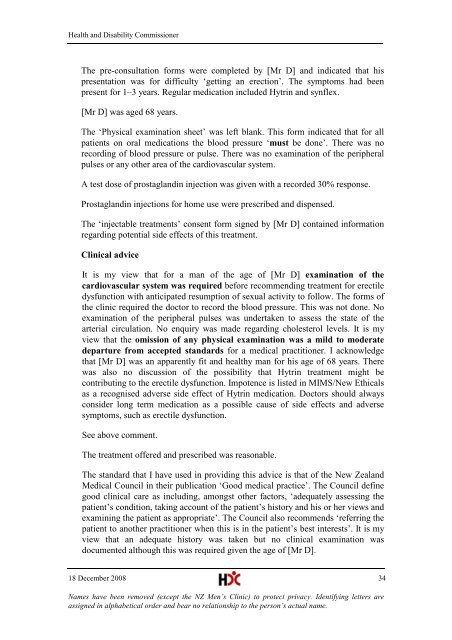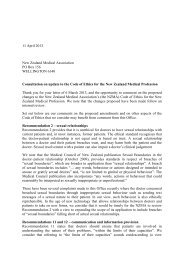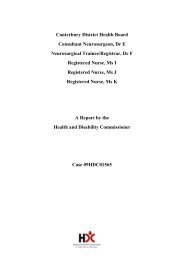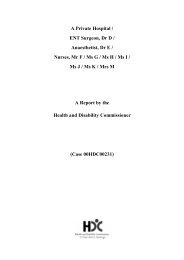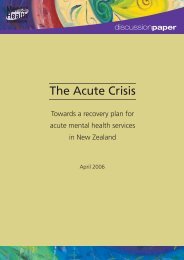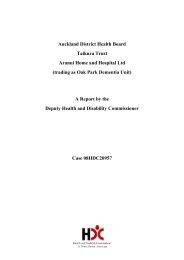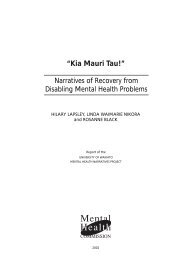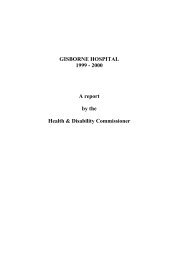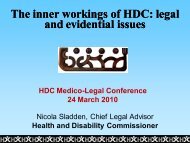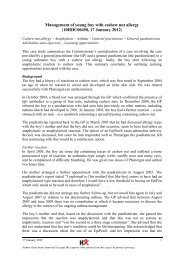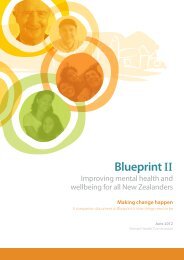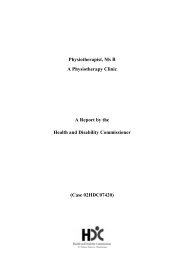Medical Practitioner, Dr E New Zealand Men's Clinic - Health and ...
Medical Practitioner, Dr E New Zealand Men's Clinic - Health and ...
Medical Practitioner, Dr E New Zealand Men's Clinic - Health and ...
Create successful ePaper yourself
Turn your PDF publications into a flip-book with our unique Google optimized e-Paper software.
<strong>Health</strong> <strong>and</strong> Disability Commissioner<br />
The pre-consultation forms were completed by [Mr D] <strong>and</strong> indicated that his<br />
presentation was for difficulty ‘getting an erection’. The symptoms had been<br />
present for 1–3 years. Regular medication included Hytrin <strong>and</strong> synflex.<br />
[Mr D] was aged 68 years.<br />
The ‘Physical examination sheet’ was left blank. This form indicated that for all<br />
patients on oral medications the blood pressure ‘must be done’. There was no<br />
recording of blood pressure or pulse. There was no examination of the peripheral<br />
pulses or any other area of the cardiovascular system.<br />
A test dose of prostagl<strong>and</strong>in injection was given with a recorded 30% response.<br />
Prostagl<strong>and</strong>in injections for home use were prescribed <strong>and</strong> dispensed.<br />
The ‘injectable treatments’ consent form signed by [Mr D] contained information<br />
regarding potential side effects of this treatment.<br />
<strong>Clinic</strong>al advice<br />
It is my view that for a man of the age of [Mr D] examination of the<br />
cardiovascular system was required before recommending treatment for erectile<br />
dysfunction with anticipated resumption of sexual activity to follow. The forms of<br />
the clinic required the doctor to record the blood pressure. This was not done. No<br />
examination of the peripheral pulses was undertaken to assess the state of the<br />
arterial circulation. No enquiry was made regarding cholesterol levels. It is my<br />
view that the omission of any physical examination was a mild to moderate<br />
departure from accepted st<strong>and</strong>ards for a medical practitioner. I acknowledge<br />
that [Mr D] was an apparently fit <strong>and</strong> healthy man for his age of 68 years. There<br />
was also no discussion of the possibility that Hytrin treatment might be<br />
contributing to the erectile dysfunction. Impotence is listed in MIMS/<strong>New</strong> Ethicals<br />
as a recognised adverse side effect of Hytrin medication. Doctors should always<br />
consider long term medication as a possible cause of side effects <strong>and</strong> adverse<br />
symptoms, such as erectile dysfunction.<br />
See above comment.<br />
The treatment offered <strong>and</strong> prescribed was reasonable.<br />
The st<strong>and</strong>ard that I have used in providing this advice is that of the <strong>New</strong> <strong>Zeal<strong>and</strong></strong><br />
<strong>Medical</strong> Council in their publication ‘Good medical practice’. The Council define<br />
good clinical care as including, amongst other factors, ‘adequately assessing the<br />
patient’s condition, taking account of the patient’s history <strong>and</strong> his or her views <strong>and</strong><br />
examining the patient as appropriate’. The Council also recommends ‘referring the<br />
patient to another practitioner when this is in the patient’s best interests’. It is my<br />
view that an adequate history was taken but no clinical examination was<br />
documented although this was required given the age of [Mr D].<br />
18 December 2008 34<br />
Names have been removed (except the NZ Men’s <strong>Clinic</strong>) to protect privacy. Identifying letters are<br />
assigned in alphabetical order <strong>and</strong> bear no relationship to the person’s actual name.


